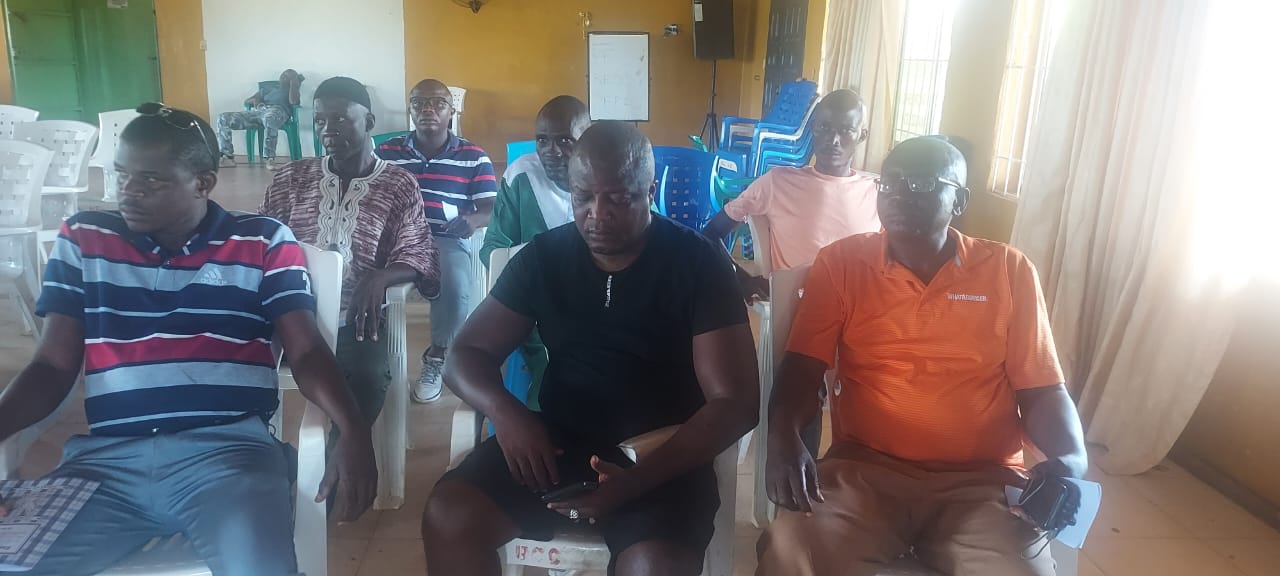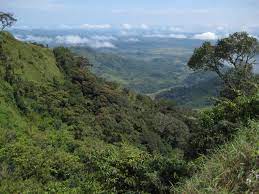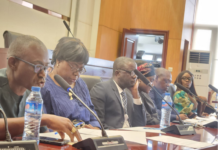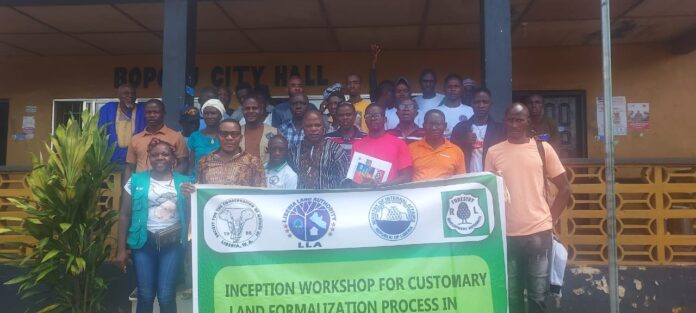In a significant stride to guarantee customary land ownership in Liberia, the Country’s oldest conservation organization, the Society for the Conservation of Nature of Liberia (SCNL) and the Liberia Land Authority (LLA) have jointly embarked on a project to resolve all boundary disputes in three clans of Gbarpolu County through community engagement dialogue and customary land formalization process.
The three clans, Zuie, Mbarma, and Normon are located in Kongba District, a densely forest District in Gbarpolu County.
SCNL’s intervention in collaboration with the LLA in the area of customary land formalization is deeply rooted in the Land Right Act of Liberia, which seeks to address issues around land tenure and ownership.
The project is being funded by Rainforest Trust, an American-based nonprofit conservation organization focused on preserving rainforests and other threatened ecosystems worldwide. Its mission is to protect endangered species and habitats by working with local communities, national governments, and organizations to establish protected areas. The Customary Land formalization activity is an additional fund secured under the existing project titled: “Liberia-Foya Reserve” a project focused on working with the government and communities to gazette the Foya proposed protected area. The Customary Land Formalization process will focus on Mbarma, Normon, and Zuie Clans.
The CLF inception workshop held in Bopolu was meant to provide a platform for open dialogue, where communities and all stakeholders could flag out boundary dispute areas, and bring forth some resolution mechanism that the project team can work to implement. This initiative is key in ensuring that the clans can manage their land and resources without fear of future contention, promoting harmony and environmental stewardship.
Establishing a conflict resolution mechanism agreed upon by the communities helps prevent delays in the formalization process and ensures that all clans feel included and heard.
Mr. James P. Mulbah, the Project Coordinator giving the overview of the project stated that the process is crucial because formalizing community land around the proposed Foya Protected Area is intended to prevent overlaps and disputes between clans and the soon-to-be GbarLo National Park.
Mulbah added that the project aims to resolve land conflicts near the proposed protected area.
During a consultative meeting in Bopolu, Gbarpolu County, Michael Taire, the SCNL Program Manager, addressed a representative group of citizens from the three clans. He stated that his organization is dedicated to assisting the Zuie, Mbarma, and Normon clans in obtaining their customary land deeds. “The process is critical as formalizing community land around the Proposed Foya Protected Area is to prevent overlaps and disputes between clans and the proposed Foya soon-to-be GbarLo National Park.
Often, unclear or contested boundaries lead to resource management issues, inter-community conflicts, and unregulated exploitation of natural resources and as such; getting these clans Deeded gives a further opportunity for the community forests around the park to enter into future conservation agreements, trade carbon, and secure other alternative support as the result of the protection of this critical biodiversity hotspot”, Mr. Taire added.

Mr. Taire further assured the citizens that the process would be funded by SCNL and facilitated in collaboration with the Liberia Land Authority to ensure the full legalization of their customary land.
He noted that this would enable them to have legal rights over their respective lands void of conflict.
“We will work along with the Forestry Development Authority, Liberia Land Authority the Internal Affairs Ministry, and the community themselves to do this Land formalization process which will help you get legal title to your land,” said Taire.
SCNL will not document the land without involving the people who know it, including youth and women. “Youth I don’t want to put you on the spot but most of the information you get today, you got it from your father, you get it from your uncle and your great grandfather Taire said.
“This is not an easy process it is very expensive even for the government itself to do it is not easy it requires time it requires money it requires plenty things that need to be put in place”
So, when you hear people talking about customary land formalization it means that they want you to document everything land water, forest, and everything you get.
“This is just the beginning of the entire process, this one we call inception program but it will not take long and we will be coming back to you in the communities to start the entire process of documenting your land.”
“I want to encourage you as you see the Liberia Land Authority, Forestry Development Authority, Ministry of Internal Affairs, and SCNL in your community please embrace them in your communities.
“SCNL will have to listen to all of the elders, chiefs, youths, and women because they know some of the historical relationships between some of these clans.”
“We can get everyone in the communities where it is not possible so we depend on all of you to be ambassadors go back with the message go back let the people that LLA, FDA, and SCNL are coming to communities to the various clients be able to work with you and we expecting you to open your arms to reason with the others clients that around you so that we can be able to find a common ground to resolve this different boundary issues”, he adds.
“The law says the land for you nothing wrong with it you can farm you can do other things but for you to get real business on the land you need that land to be documented you need to get paper before you transact on the land and that paper is what we want to work with you people to get”, Tarie said.
In response to Mr. Taire, citizens from the Zuie, Mbarma, and Normon clans overwhelmingly welcomed the project and pledged to cooperate with SCNL, LLA, FDA, and other partners to ensure the successful implementation and legalization of their customary land.
The gathering included chiefs, elders, women, and youth, all expressing that SCNL’s activities in the clans have been a blessing due to the innovative programs the organization has introduced.
In separate remarks, they emphasized certain conflict zones that require urgent attention from SCNL’s conflict resolution and land documentation programs. The citizens firmly believe that with the land formalization process in place, land conflicts and boundary disputes will be significantly reduced, enabling them to secure title to the land and access its benefits without further issues.

They urged SCNL and LLA to involve them at all stages of the project to ensure they achieve true legal ownership of their land. Members of the Legislature were also present at the meeting, encouraging their constituents to collaborate with SCNL and LLA to legitimize their land, not only for farming but also for business opportunities that would benefit the community.
Legislators from the district assured SCNL and its partners of their support for this process, emphasizing that the project directly impacts the livelihoods of their constituents.
Jonah Segbe, the Communication and Outreach Officer at the LLA, stated that the project marks a new beginning in addressing issues related to overlapping land ownership and land conflicts.
He urged the beneficiaries to engage with the LLA, which will help in developing by-laws aimed at preventing crises and establishing a new framework for customary land ownership in Gbapolu County. Mr. Segbe emphasized that the land documentation process is advantageous for everyone involved, as it encourages open discussions to identify and resolve existing land conflicts within the affected communities.























